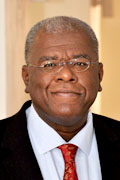Latest News Archive
Please select Category, Year, and then Month to display items
15 March 2022
|
Story Rulanzen Martin
|
Photo Supplied
 The keynote speakers are Dr Khabele Motlosa (right), Senior Lecturer in the Department of Political and Administrative Studies at NUL, and leading Pan-Africanist scholar Prof Molefi Kete Asante(left).
The keynote speakers are Dr Khabele Motlosa (right), Senior Lecturer in the Department of Political and Administrative Studies at NUL, and leading Pan-Africanist scholar Prof Molefi Kete Asante(left).
The
Centre for Gender and Africa Studies (CGAS) at the University of the Free State (UFS), together with the
National University of Lesotho (NUL) and the Academic Forum for Development of Lesotho, is hosting an online think tank on the transnational communities of the Lesotho-South Africa border from 19 to 21 March 2021. The theme of the conference is
Lesotho and South Africa: a clarion call for a Pan-Africanist future.
Dr Munyaradzi Mushonga, Programme Director: Africa Studies Programme in CGAS, is the convenor of the conference and is also leading the UFS borderlands panel. The borderlands project is jointly funded by the Office of the Dean: Faculty of the Humanities at the UFS, and the National Institute for the Humanities and Social Sciences (NIHSS).
For more information and to register for the conference, click here

Prof. Jansen elected as Fellow of TWAS
2010-10-27
 |
| Prof. Jonathan Jansen |
|
Members attending the recent 21st General Meeting of the Academy of Sciences for the Developing World (TWAS), elected Prof. Jonathan Jansen, Rector and Vice-Chancellor of the University of the Free State (UFS), as a Fellow of TWAS.
The meeting was held in Hyderabad in India and Indian Prime Minister Manmohan Singh delivered the inaugural lecture.
According to Prof. Jacob Palis, President of TWAS, the decision made by the TWAS members is a clear recognition of Prof. Jansen’s outstanding contribution to science and its promotion in the developing world.
TWAS Fellows live and work in developing countries and represent 85 percent of the TWAS membership.
– Lize du Plessis
|